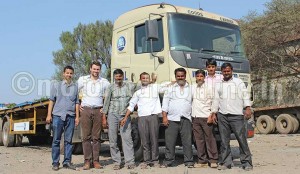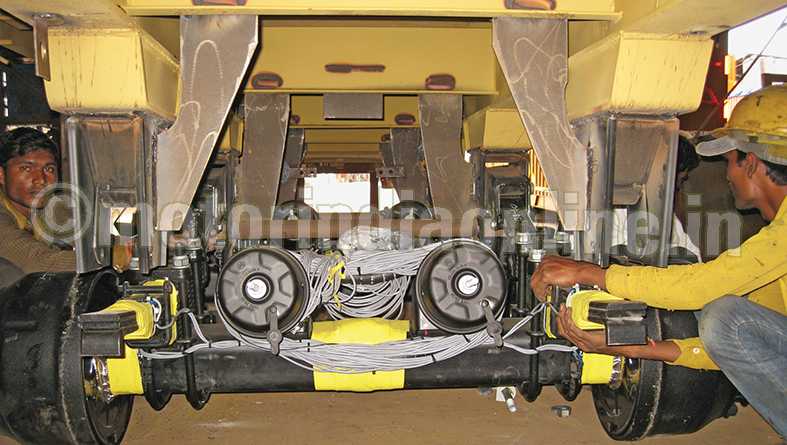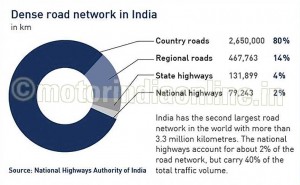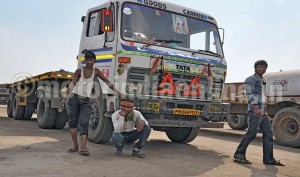BPW, a leading global manufacturer of intelligent running gear systems for trailers and semi-trailers, is focused on plunging deeper into the Indian market. For the purpose, the company has redefined the perfect running gear in an extensive practical test on challenging Indian road conditions.
A Tata Prima towed a semi-trailer over potholes and fought its way through the mud on Indian roads. Harinder Yadav has already driven more than 12,000 km with the truck and trailer combination. Under the chassis of the towed unit, you will find the ECO Cargo VB from BPW. The 28-year-old driver is married with children and works for Ideal Movers, the logistics company based in Mumbai. He is intensively testing the running gear made in Germany. His interim verdict sounds very promising: “I will recommend it for every trailer in India.”
Harinder Yadav has been carried away by the smooth driving properties of the running gear as well as its first-class braking properties.
Interesting market

This is a good start for BPW in India. The Wiehl company is busy expanding its foothold in the Indian market. At present, BPW is intensively testing local conditions so that it has the right product to really capture the market. “As a first step, we decided to use the ECO Cargo VB running gear in order to try and cope with the harsh conditions in the market and to convince customers with BPW quality,” says Philipp Bäcker, General Manager at BPW Trailer Systems India. The wholly-owned subsidiary, founded in 2010, is currently building up a sales and service network with local assembly.
BPW has been supplying axles to the country in the last few years, although they have predominantly been installed in special vehicles. With the field test, BPW is now searching for the right products to offer in the Indian market. For the purpose, the engineers need to gain as comprehensive a picture as possible of how the vehicles are used day-in and day-out.
There are a few motorways in India linking the major centres, but the road to customers often involves gravel tracks. Furthermore, there are several extensive potholes on the roads, which are very uneven to boot. “As a result, the complete payload is sometimes only supported on a single axle while the two other axles are in the air,” says Reiner Moog, the man in charge of the field test in India. These are precisely the loading conditions that the running gear has been designed for.
Robust running gear
Engineers from BPW only developed the ECO Cargo VB running gear as recently as last year. “ECO Cargo VB is a modern running gear with mechanical suspension. The robust configuration for a long service life, optimisation for low tyre wear as well as simplified installation and repair possibilities meant that it is particularly suitable for markets such as India,” explains Bernd Rhein, technical customer consultant and project manager at BPW.
It comes down to the details, he continues, such as the precise tracking possibility and wheel guidance, durable bearings and replaceable spring slides. For the field test, BPW selected the three-axle running gear with large ground clearance, adapted brake force distribution and anti-lock brake system (ABS). “We decided on an axle load of 12 tonnes. This is in accordance with national regulations,” says the test leader Reiner Moog.
For the field test, BPW is working with Seamless Autotech which makes the chassis. “We expect our suppliers to offer good quality, many variants and corresponding service. BPW meets these requirements,” says Gurpeet Ahluwalia, Sales & Marketing Director at Seamless Autotech.
The team in Pune needed more than 10 days to complete and fit out the platform semi-trailer. This was precisely what Harinder Yadav needed, since he has completed all the tours to date without any particular incidents of note. In most cases, he has been transporting heavy steel coils with a Tata Prima 4218 tractor vehicle.
However, the truck with its engine generating about 180 HP does not allow him to achieve any significant speeds. His average speed is 41.2 km/h, although it should be noted that 30 km/h is quite normal for India. His maximum speed is also not much above the average, at 60 km/h.
Another reason why he drives so slowly is related to the numerous border controls between the individual federal States. It is by no means rare that he has to wait several hours or even days. It is probable that the team will not achieve their target of 50,000 km within one year for the field test. “There are indeed significant differences compared to driving in Europe. For example, time here seems to be of secondary importance. Nevertheless, we want to be seen as an international mobility partner in India as well,” explains Philipp Bäcker, who knows the country well.
Important logistics provider
Bäcker also established contact with Ideal Movers, the logistics company. With its fleet of almost 2,000 vehicles, it is one of the largest such companies in India. Only recently, did an Indian trade magazine select Ideal Movers as the best truck fleet operator of the year. “Our services are increasingly appreciated by our customers, because we can guarantee reliable deliveries on schedule,” emphasises Raghav Himatsingka, Chief Executive Officer at Ideal Movers. Furthermore, the company is one of those which strictly adhere to the legislation. For example, it will not send out any overloaded vehicles. Also, Ideal Movers makes sure that its drivers and workforce receive regular ongoing training.
The first estimate has been increasingly confirmed following the first few months. “So far, it looks as if we have selected exactly the right running gear,” says Reiner Moog. He and his team wired up the entire trailer in order to be able to make statements of this kind. Sensors distributed all around the vehicle and the running gear measure the loads with the greatest of precision, and even register the smallest expansion of the material. “At first, we save the data from all the sensors installed in the vehicle on a data logger that is accommodated under the frame. From there, we can download it using a modem connected to the logger, which means we have a current picture of the loads on the running gear at all times,” explains the test leader.
Long suspension travel distances
The test team has already collected some important information over the past few months. In India, it is the distortions in the carriageway that impose the greatest loadings on the running gear. It’s the same thing with the motorways. “This results in driving manoeuvres at low speed involving long spring travel amplitudes leading to severe running gear distortion, which can be asymmetrical in some cases,” says Moog, commenting on the results of the analysis.
Highly dynamic manoeuvres such as driving over potholes at high speed are relatively rare, on the other hand. Consequently, it is important for mechanical trailer vehicles to have adequate suspension compression and rebound travels, adds the specialist.
Furthermore, it is particularly important for the bearings on the running gear to be well sealed, because the roads and yards get extremely water-logged and muddy, especially during the monsoon.
Harinder Yadav still has a considerable distance to cover. It is possible that he will not manage the intended 50,000 km in one year. But even after that, there will still be plenty of time left for rolling along India’s roads with the trailer and its ECO Cargo VB running gear.
BPW Trailer Systems India is the 100 per cent subsidiary of BPW Bergische Achsen KG. The company looks back on a tradition of more than 115 years and is still owner-managed with a consolidated group turnover of about 1 billion EUR and more than 5,000 employees. As an international mobility and systems partner, the BPW Group offers solutions for the transport industry from a single source. With its innovative running gear technology ranging from axle and suspension to user-friendly telematics applications, the company creates outstanding transparency in loading and transport processes and facilitates efficient fleet management. The company is Europe’s leading manufacturer of CV trailer axles and offers axles with capacities upto 20 tonnes.
Author: Ralf Johanning, Photos: Reiner Moog, Bernd Rhein Illustration: hpkalyani – istockphoto.com


